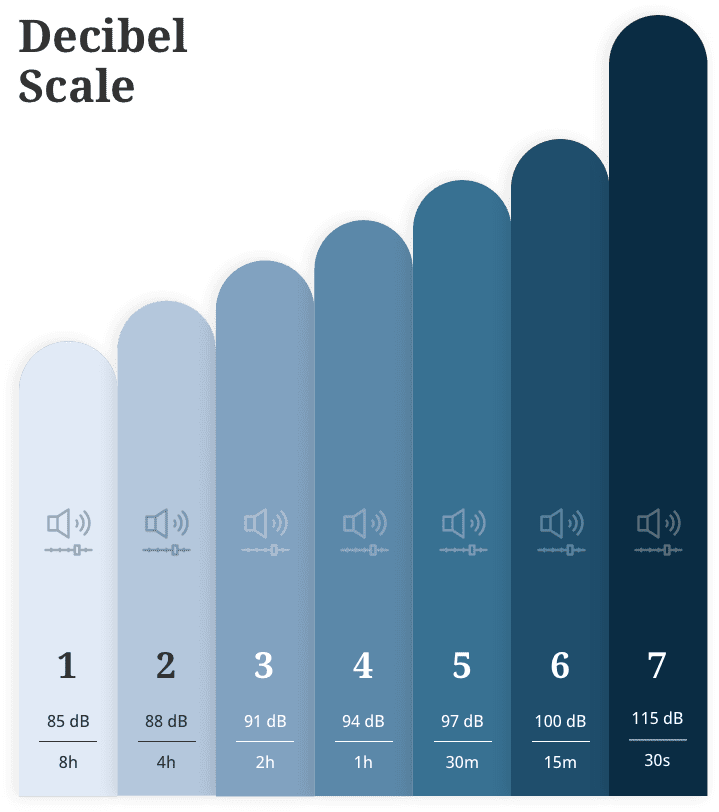What do eight hours of city traffic, 30 minutes in a nightclub and 30 seconds of leaf blowing all have in common? They’re all loud enough and long enough to cause permanent hearing loss. If you can still understand conversations in crowded rooms and take down a grocery list over the phone without the help of hearing aids – great! Let’s keep it that way.
Read About Hearing AidsSome sounds are loud and sudden, such as fireworks (watch us on Daytime Columbus for the special on the July 4th Red, White & Boom! celebration) or gunshots. Then there’s the constant, relentless din of city traffic. There are two main aspects to what your ears can handle before they start losing their ability to receive and process sounds correctly:
The level of noise (decibels = dB), and
The amount of time the person is exposed to that level of noise before hearing loss becomes permanent.

According to the Occupational Health and Safety Administration (OSHA), about 30 million people work in a hazardous noise environment. An average of 21,000 people a year report permanent, significant, work-related hearing loss. Extend that 21,000 out to their friends, family and co-workers, and you can imagine how difficult the situation really is for so many people across the country. OSHA also reports that hearing loss-related worker’s compensation claims average about $242 million annually – making it a very expensive problem as well.
For that reason, NIOSH guidelines urge employers to ensure that their workers are not exposed to any more than 85 dB during the eight-hour work day. While some workplace acoustics engineering options can cut down on noise levels, the most direct ways to prevent hearing loss for the most people in the workplace include:

Noise environments that you might be exposed to occupationally or recreationally are different. So it is important to select noise controls and ear protection that fit the situation appropriately. The following are some examples of how hearing loss prevention techniques can be applied in different situations:


Whether you are hunting game, practicing at the firing range or tracking down criminals, acute hearing is essential. Gunshots are among the most damaging, high-decibel sounds there are, and if you are exposed to them even briefly, they can cause irreversible hearing loss. Standard or custom electronic hearing protection devices can be configured to amplify ambient sounds while lowering gunfire noise for people in these situations.

Musicians need to hear the most nuanced sounds while protecting their hearing from the sounds they and their fellow musicians create. Over-the-counter earplugs are completely inadequate for the job. Musicians require custom ear molds and in-ear monitors that can deliver the notes they must hear while protecting their ears from damaging decibels.
If you are a frequent concert attendee (classical, punk or anything else), there are also custom ear molds for you. (Note: turning your MP3 player all the way up can measure up to 105 dB, which can cause hearing loss after less than 10 minutes, so go easy on the volume controls.)

If you work in an airport, factory or workshop; on a farm or with landscaping equipment; or around cars and motorcycles, the noise can regularly go to 90 decibels and higher for prolonged periods of time. Properly fitted industrial earplugs can really help lower the decibel level that reaches your ears, protecting your hearing from permanent damage.
Whatever circumstances might place you in a noisy environment, there is likely a form of ear protection tailored to your situation. These include equipment for hunting, shooting, musical performance, swimming, surfing, flying, motorsports, sleep, industrial environments and more. Your hearing care professional can guide you in determining which device is best for you, but some of the options are:
Hearing Choice by Phonak Sound Plugs by Great Lakes Earmold Lab Defendear by WestoneFind out how to protect your hearing! Contact us today to learn about custom hearing loss prevention solutions that can handle your sound environment.